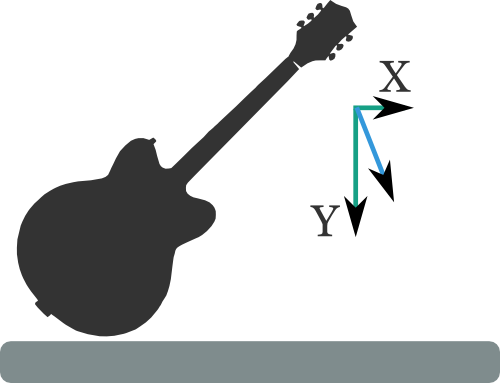“Loud” can become a vicious cycle, and FAST.
Please Remember:
The opinions expressed are mine only. These opinions do not necessarily reflect anybody else’s opinions. I do not own, operate, manage, or represent any band, venue, or company that I talk about, unless explicitly noted.


I’ve mixed my fair share of bands in small, “live” rooms. What I mean by “live” is that the space has a lot of hard surfaces. For any sound introduced into the space, a good deal of the pressure wave travels directly to the audience. At the same time, a large portion of the same wave encounters an acoustically reflective boundary, and re-emits into the room. The re-emitted sound has a pretty good chance of also reaching the audience, even if the overall intensity has dropped somewhat.
This is why audio humans, music folks, and audience persons say things like “this is a loud room.” It’s not their imagination, or just a trick of perception. It’s physics, and you might not realize it, but physics impacts your ability to build a fan base and get paid decently for your efforts as a band.
I’m serious.
I’m sure that you’ve heard all the old (and not old) saws about excessive volume driving people away. I’ve written about that on this site. There have been plenty of discussions about volume wars. What I haven’t heard much talk about, though, is how excessive volume not only drives people away, but also how people being driven away creates even more excessive volume.
The Cycle Of Increasing Loud
The hingepoint for all this is that humans are pretty decent at being acoustical absorbers. Pack a room with a bunch of water-filled creatures that drape themselves in fabric, and a fair amount of sonic energy is prevented from bouncing around.
If you remove people from the room, then the “human absorption” factor drops. As the absorption drops, the amount of sound that can travel to the remaining listeners goes up, as does the amount of sound that can travel to them indirectly after hitting a boundary.
So, here’s what happens.
A band that produces a good deal of volume gets on stage in a small room with lively acoustics. They’re still building their following (or it’s just an off night), and so there aren’t a ton of humans available for absorption. The indirect sound from room reflections combines with their already “just a bit hot” volume to create “kinda uncomfortable” volume. The folks who aren’t really into it decide to head for a different part of the bar, or go outside. Now, there’s even less absorption in the room, especially for the people who were hanging out next to the folks who just left. As a result, the “just slightly too loud” show is now “just slightly more just slightly too loud.”
A couple more people decide to take a break from the onslaught.
The room is now a bit less absorptive.
The show gets a bit louder.
Do you see where this is going?
The “loud” ends up building on itself, progressively clearing the room, until some equilibrium point is reached. The band is playing to fewer people, which makes the show less fun. If the venue is a bar, the show is less profitable for the room. On top of that, “walk up” traffic from people in the neighborhood is pushed away, because the show is uncomfortably loud while simultaneously feeling “dead.”
The band’s playing, but they’re not generating much momentum for their career.
For Your Own Sake, Stay Away From The Tipping Point
The key to not being bitten by a vicious cycle is to avoid feeding the cycle. If you’re in a band that needs to grow its fanbase, you will do yourself a huge favor by figuring out how to be elite at being quiet.
Seriously, you should become freaking NINJAS at putting on a show that generates less than 100 dB SPL C from the stage.
Although…maybe that’s not really ninjitsu. Maybe that’s more like “normal” difficulty. Get down to 97 dBC for a “heroic” rating, and 94 for “legendary” status. If you want to be a mythical figure, then you should be able to pull things back even farther when you notice that you’re in an exceptionally challenging room. Yes, your guitar tone might not “sing” in exactly the way it does when you get on the metaphorical gas in your practice space. Yes, the bass might not feel like it can move continents. Yes, the snare might not have that supermassive “crack-boom” that you always wanted.
But the thing is that nobody in the room cares about any of that, except for maybe those two dudes from the big-box music store who are totally opinionated about “creaminess,” and “breakup,” and “punch,” and “really taking advantage of those EL84 tubes,” and “rumble,” and “pop.” Ask yourself: Are they actually helping you write your ticket? Are they really the people you need to impress?
(The answer is probably “no,” by the way.)
Stay away from the tipping point, and you’ll have a much better chance of having more people in the room who love hearing your songs. That means a better show overall, more money for the venue, more money for you, and ultimately, a more viable career path.
…and isn’t that what this is all about?